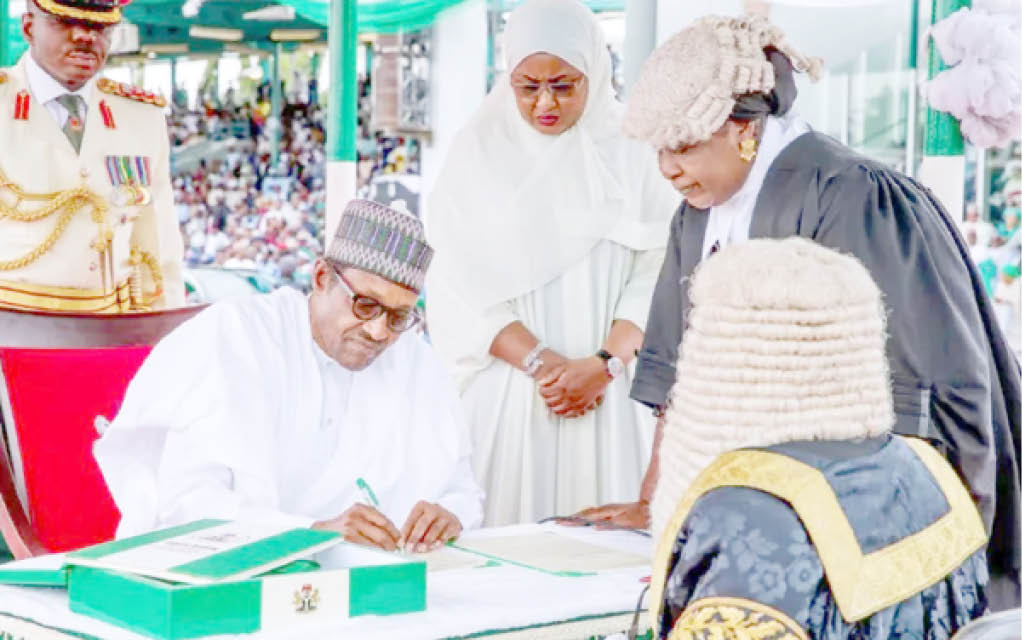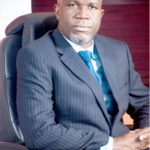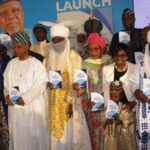President Muhammadu Buhari is leaving office as President of the Federal Republic of Nigeria in the next one year with several unfinished businesses ahead of the constitutionally fixed time.
The president had assumed the mantle of leadership on May 29, 2015 on the platform of the All Progressives Congress (APC) after ousting the Peoples Democratic Party (PDP) which had been in power for 16 uninterrupted years.
- Reps race: Buhari’s nephew, others, lose APC tickets as Doguwa, Betara win
- Crack in APC NWC as Adamu under fire over ‘leadership style’
The feat was achieved because of the failure of the Goodluck Jonathan administration to tackle the nation’s major challenges, especially the increasing state of insecurity, the rising rate of unemployment and the scourge of corruption.
Seven years down the line, the Buhari administration has been working to fulfill the 2015 and 2019 electioneering campaign promises to tackle corruption, address the challenges of insecurity and revive the economy.
When Buhari came on board, expectations were very high that the country had finally got ‘Mr Fix It’ who will tackle the challenges facing the nation head-on. Has he been able to live up to these high expectations from Nigerians in the midst of skyrocketing increase in the prices of commodities; unemployment; poverty; the arrest of Accountant General of the Federation over alleged N80 billion fraud; killings of innocent Nigerians and security personnel by Boko Haram, bandits, and kidnappers in the North East, North West, and North Central; and the threat posed by the activities of secessionist groups in the South-West and South-East, especially the proscribed Indigenous People of Biafra (IPOB).
In this special piece on Democracy Day, Daily Trust provides the views of experts on critical matters President Buhari must address before leaving the stage in one year’s time and the grounds the presidency believes the current APC-led administration has covered in the last seven years to justify the expectations of citizens.
‘Credible elections, completion of legacy projects, end Boko Haram menace, strike’
Pundits believe the current government needs to do everything humanly possible to ensure that the country remains united after the 2023 general elections in view of the emotional feeling attached to the zoning of presidential seat.
An Associate Professor of Political Sociology, University of Abuja, Dr Abubakar Umar Kari, in an interview, urged the president to ensure that the 2023 general elections were free, fair, transparent, credible and acceptable to all.
The university don, who said attention must be focused on the completion of his legacy projects, advised the president to end the menace of the Boko Haram insurgency in the North East and put a halt to workers’ strike within the tertiary education sector before leaving office.
He also asked the president to galvanise his anti-corruption fight by ensuring that politically exposed persons as much as possible were prosecuted.
Dr Kari said: “President Buhari has a lot to accomplish in the final 12 months of his administration.
“Most of his signature projects are still work in progress: particularly in the areas of transportation (2nd Niger Bridge, expansion of the Abuja-Kano highway, East-West Road, Kaduna-Kano rail line, Lagos-Ibadan Expressway, etc); Power (Zungeru hydro-electric project and several others that have reached advanced stage); aviation (the envisaged and much-hyped Air Nigeria national carrier), etc.
“Also, 12 months is enough time for the president to finish off Boko Haram and decisively tackle the menace of armed bandits, insurgents and other terrorist groups threatening the nation. More than anything else, security (or lack of it) will define his presidency. He must therefore spare nothing in ensuring the return to a state of peace and safety of lives and property in all the nooks and crannies of the country.
“He equally ought to use the remaining period to bring back on course his anti-corruption fight (even if he should just concentrate on ensuring that as many politically exposed persons as possible are brought to book).
“Of course, the president still has the time and chance to address once and for all the intractable spate of workers strike within the tertiary education sector – particularly strike actions by ASUU and other campus-based unions.
“Equally importantly, Buhari should use the remaining period to ensure that the democratic process is not derailed; and that the 2023 general elections are free, fair, transparent, credible and acceptable to all.”
Firm foundation to fight corruption must be laid – Rafsanjani
On his part, Awwal Musa Rafsanjani, Executive Director at Civil Society Legislative Advocacy Centre (CISLAC), said Nigeria was still struggling with issues of corruption, insecurity and bad governance after seven years of the Buhari administration.
He, therefore, asked the president to lay a firm foundation for fighting corruption and give more priority to the fight against insecurity.
Rafsanjani said: “Amidst the growing political and socio-economic tension in Nigeria and how government officials are increasingly looting the public treasury without accountability and transparency under the watch of President Buhari, Nigerians have always been at the receiving end of the recklessness that government officials have been involved in.
“It is absolutely necessary for the president to use this last one year of his administration to significantly cover the key areas.
“Corruption is central to the president’s campaign promises and what we have witnessed over the last seven years was nothing more than an increase in corruption cases amongst officials, the most recent of which is the corruption case of the Accountant General of the Federation.
“The president must work to ensure that before leaving office, he laid down a firm foundation for fighting corruption so that when the next government takes over issues of corruption, it would have been greatly improved and bettered.
“Insecurity must also be given more priority despite the claims by the government that it is fighting insecurity. Nigerians can only be more prosperous and live peacefully when elements of security are in place to ensure that people’s lives and properties are adequate protected.”
He added: “At the very foundation of every successful democracy are principles of good governance and integrity. The president must ensure that before leaving office, all necessary measures are taken in order to allow good governance to thrive in Nigeria. The president must also ensure that before leaving office, people of character and integrity are elected into public office.
“Nigerians are yearning for strong democratic institutions that will ensure that they fully enjoy the dividends of democracy and seeing that the president is leaving in the next one year, he must therefore do everything in his power to ensure that Nigerians appreciate true democracy.”
We will do more in 12 months – Presidency
The Special Adviser to the President on Media Publicity, Femi Adesina, who presented one-stop shop of the achievements of the Muhammadu Buhari administration at seven, on Saturday, said: “Revisionists would want to look at security challenges, which are being robustly tackled, alone. But we look at the entire gamut, and honest and fair Nigerians will admit that a lot has been done, and a lot more will still be done in the 12 months ahead.”
The presidential spokesman, who highlighted the strides in infrastructural development; roads, bridges, rail, air and seaports, housing; oil and gas reforms, digital economy, mines and steel development, agriculture, education, health, creative industry, and sports, among others, said the Buhari administration represented service to the people, and nothing else.
The presidency said under President Buhari, Nigeria has seen the most ambitious legislative programme in its history as several landmark bills have been passed or amended in the last seven years in order to have positive impacts on the fight against corruption, insecurity, economy, and electoral process.
Adesina recalled that February 25, President Buhari signed the long-awaited Electoral Act Amendment Bill 2022 into law, saying the new law contains salient and praiseworthy provisions that could positively revolutionize elections in Nigeria through the introduction of new technological innovations that would guarantee the constitutional rights of citizens to vote and to do so effectively.
He said the law would not only improve and engender clarity, effectiveness and transparency of the election process but also reduce to the barest minimum incidences of acrimony arising from dissatisfied candidates and political parties.
“These commendable efforts are in line with our policy to bequeath posterity and landmark legal framework that paves the way for credible and sound electoral process that we would all be proud of,” he said.
Meanwhile the Special Adviser to the President on Media Publicity, Femi Adesina, has promised that the Muhammadu Buhari government will build on the feats recorded in seven years in the last 12 months of the administration.
He stated this a statement that accompanied a fact-sheet released Saturday that showcased the achievements of the Muhammadu Buhari administration on its seventh anniversary.
“Revisionists would want to look at security challenges, which are being robustly tackled, alone. But we look at the entire gamut, and honest and fair Nigerians will admit that a lot has been done, and a lot more will still be done in the 12 months ahead,” Adesina said.
The presidential spokesman, who highlighted the strides in infrastructural development; roads, bridges, rail, air and seaports, housing; oil and gas reforms, digital economy, mines and steel development, agriculture, education, health, creative industry, and sports, among others, said the Buhari administration represented service to the people, and nothing else.
The document said with legislative reform, Nigeria under President Buhari’s watch had seen the biggest and most ambitious federal infrastructure programme since Nigeria’s Independence.
The Presidency said the Nigerian National Petroleum Corporation (NNPC), Tuesday, December 21, 2021, handed over a symbolic cheque of N621.24 Billion for the rehabilitation of 21 critical roads (totalling 1,800km) across the country, through the Road Infrastructure Tax Credit Scheme under the Executive Order 7 signed on January 25, 2019 by President Buhari.
According to the document, “this does not mean that NNPC has gone into the business of constructing roads; instead it is financing the construction of roads, through its tax liabilities.”
It disclosed that the NNPC which has transformed into a Limited Liability Company after the presidential assent to the Petroleum Industry Act on August 16, 2021 will be formally unveiled by the President in July 2022.
On electricity, the document said an incremental 4,000MW plus of power generating assets will be completed during the life of the Buhari administration, including the Zungeru Hydro, Kashimbila Hydro, Afam III Fast Power, Kudenda Kaduna Power Plant, the Okpai Phase 2 Plant, the Dangote Refinery Power Plant, and others.

 Join Daily Trust WhatsApp Community For Quick Access To News and Happenings Around You.
Join Daily Trust WhatsApp Community For Quick Access To News and Happenings Around You.


